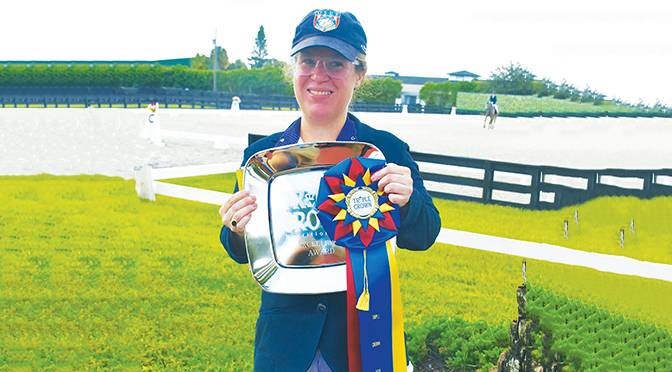The Power of Positivity Eleanor Brimmer Embraces Life As A Para-Equestrian
While Eleanor “Ellie” Brimmer grew up like many other girls with a passion for horses, her situation is unique. She has cerebral palsy, yet Brimmer refuses to let physical challenges hold her back and instead finds ways to rise to the challenge of equestrian competition.
Brimmer grew up in Minnesota but now calls Wellington her full-time home after making a permanent move here in 2015. “Minnesota is a nice place to be from — beautiful country, but brutal winters,” she said.
Those tough winters made life, and riding, much more difficult for her physically, but you’ll never hear Brimmer complaining. After all, riding horses is in her blood.
“My grandpa immigrated from Ireland and was a master of foxhounds,” she explained. “My mother rode shows, too. She competed on the Winter Equestrian Festival circuit.”
Keeping with her heritage, Brimmer competed as a hunter/jumper equestrian in college. She found herself limited in fence height due to balance issues, but she was determined to find ways to keep her passion for horse competition moving forward.
“Dressage is a way to keep four on the floor,” Brimmer laughed.
When asked her favorite exercises in dressage, she explained that it’s more than just a step or movement that she enjoys.
“My test is walk and trot,” she said. “But I love that feeling when you can execute really well and have total control. It’s addictive.”
Working on musical freestyle programs is also appealing, as she contributes a great deal to the choreography and musical choices. In October, Brimmer and her Hanoverian mare, Argentinia — lovingly called “Jenny” — were invited to perform a musical freestyle program for the Professional Association of Therapeutic Horsemanship (PATH) International Conference for riding instructors.
Brimmer’s para-equestrian career is impressive. She was long-listed for the 2012 Paralympic Games and has brought home several accolades, most recently the Triple Crown Excellence Award.
Recently, Brimmer was reclassified and moved into Grade III for competitions, and she feels this is a more appropriate level, paving the way for a run at the 2020 Paralympic Games in Tokyo, Japan.
“I’m really happy to have the opportunity to get in front of international judges,” she said. “There are no para-riders in Minnesota, and it is more meaningful to compete against others directly.”
Living in Wellington contributes greatly to her ability to train and pursue a career in the equestrian field. Not only are there more competitions nearby, but she has found wonderful resources and support in the local community.
Coach and trainer Andrea Woodard loves the attitude and focus that Brimmer brings to the ring. “I see her determination, and it makes me proud to be a part of her journey,” Woodard said.
Brimmer is only the second para-equestrian rider that Woodard had ever worked with directly, but she is inspired by the continuous dedication and positive outlook.
“Dressage is like playing chess,” Brimmer said. “It is a very subtle art, designed for higher thinkers. It is a very elegant sport.”
Woodard said that the deep bond between horse and rider required in para-riding is dressage in its truest form.
“She can’t muscle a horse into doing what she wants,” Woodard said. “There has to be a trust and understanding, and the horse must want to do whatever she asks.”
Brimmer describes Jenny as having a “sassy attitude,” but there is no doubt that the rider shares this trait. All you have to do is watch her mount and ride to see it.
Without hesitation, Brimmer grabs a stepstool and climbs atop the horse without assistance. The pair silently work their way around the ring several times before transitioning into trot and walk sequences. Just a horse and rider, moving as one unit.
Para-dressage is still dressage, with movements the same as those of able-bodied riders.
“Para means parallel, not paralyzed,” Brimmer said. “Our movements are the same. We have some adaptive equipment.”
Brimmer shows off the magnets on the bottom of her boots, an approved design to help her keep them in the stirrups while riding. “It’s a modification, not an advantage. It levels the field,” she said.
Another method Brimmer implements is the use of two whips instead of one.
“Jenny is a sensitive horse and responds very well to the light touch of the whip for directional commands,” she said.
Brimmer’s first love is horses, and she takes every opportunity to work in the sport. In addition to working for the Adequan Global Dressage Festival, taking inventory of everything including ribbons and trophies, she also volunteers as a ring steward for other shows.
For young people who want to work in the industry, Brimmer has some advice. “Go into it with an open mind,” she said. “You may not be a rider or trainer, but there are lots of opportunities in the equestrian community.”
Always at Brimmer’s side when not on horseback is a little black-and-white, mixed-breed dog, Maya. The 10-year-old is a rescue Brimmer adopted while at a horse show, and the bond between the two is another example of Brimmer’s love and connection to animals.
“She’s my Velcro-dog,” Brimmer said as the dog rested its head on her lap.
The two are so close that the dog must remain indoors while she rides.
“Maya would chase me around on the horse if I let her out, so she gets to wait indoors while I train,” Brimmer explained.
Brimmer’s bright sense of humor and happy attitude are infectious, and everyone around the barn has a smile and a wave for her as she walks the grounds. It’s the home turf for this Paralympic Games prospect, and she continues to serve as role model for all equestrians.
